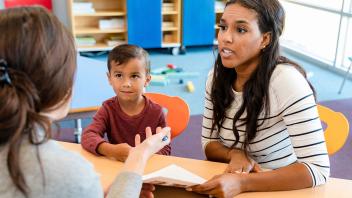One of my blog posts that got people talking was the one about our decision to enroll Anna in kindergarten as a 5 year old (rather than waiting until she turned 6). Both our girls have summer birthdays; we waited to send our older daughter, but wrestled with the same decision for our younger daughter.
A related (but different) contentious topic surrounds full- vs. half-day kindergarten, a topic that’s always in the news. A new study in Early Childhood Research Quarterly supports the research that says kids who go to kindergarten all day learn more about literacy and math than kids who only go for a half day. It’s especially true for kids who are in smaller classes and for kids who are at risk. It’s the same finding that is supported by other studies (example here ).
What’s not clear from the evidence is whether the benefits from the full-day programs last beyond the kindergarten year. Some follow-up studies suggest that the effects of full-day kindergarten deteriorate over time. Personally, I think that probably speaks more to the intensity of instruction in later years than it does about the lack of effect from full day kindergarten.
Our public school only offers full-day kindergarten, but many of our private schools offer both full- and half-day programs. If I had to choose, I’d go with full-day. But others disagree, citing that’s just too much school to soon. What’s your opinion?

